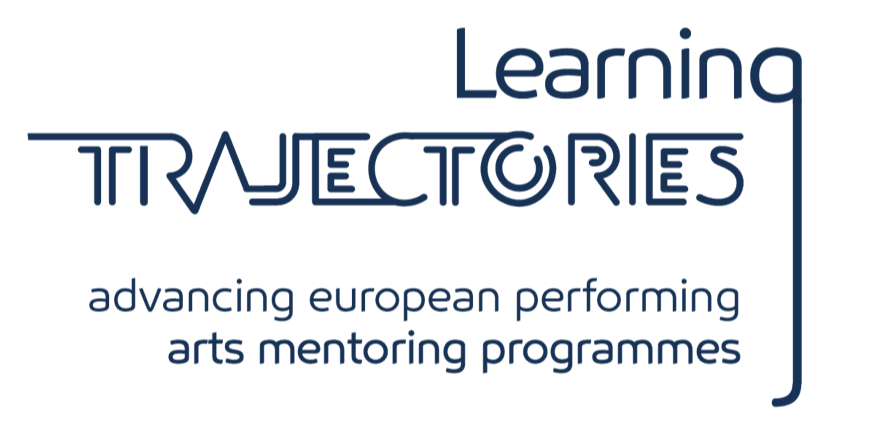 FACE together with Eunia (Sweden), On the Move (Belgium) and MateraHub (Italy) have implemented an exciting project dedicated to rethinking internationalisation programmes in the performing arts. Learning Trajectories publications are intended as a resource to help live art workers to broaden their thinking, practises and networks beyond national borders. The outcomes target performing arts professionals and organisations, in particular:
FACE together with Eunia (Sweden), On the Move (Belgium) and MateraHub (Italy) have implemented an exciting project dedicated to rethinking internationalisation programmes in the performing arts. Learning Trajectories publications are intended as a resource to help live art workers to broaden their thinking, practises and networks beyond national borders. The outcomes target performing arts professionals and organisations, in particular:
- Trainers and mentors of intermediary organisations providing expertise to cultural managers, producers and artists who seek to operate internationally but who still lack the tools and methodologies to do so;
- Cultural managers, producers and artists seeking to develop their capacity to operate in a European or international context and who currently have limited experience or who need to strategize their approach in a better way;
- European networks and platforms that support the international capacity of their members to operate in a European or international context and that have limited experiences or a need to strategize their approach in a better way.
Resource Paper – International professional development programmes in the performing arts
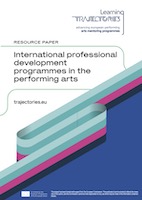 This Resource Paper reflects on the research that led to the new methodological tools published during the Learning Trajectories project. Collecting insights from case studies, survey responses, interviews with stakeholders, and relevant literature, this publication covers a large variety of circumstances and countries, and explores programmes led by independent arts organisations, public bodies, and consortia active at regional, national and European levels.
This Resource Paper reflects on the research that led to the new methodological tools published during the Learning Trajectories project. Collecting insights from case studies, survey responses, interviews with stakeholders, and relevant literature, this publication covers a large variety of circumstances and countries, and explores programmes led by independent arts organisations, public bodies, and consortia active at regional, national and European levels.
In detailing our working methods and research, the goal is to provide context for our recommendations and to frame the questions we developed alongside the various stakeholders involved in professional development programmes, from organisers to facilitators to direct beneficiaries.
Terminology – International professional development programmes in the performing arts
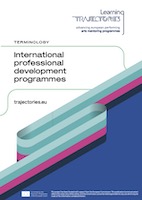 This document provides the definitions of essential terms and roles that serve as references for the various guides published during the project. It invites professional development programme organisers, facilitators and participants to reflect upon, discuss and question the terminology adopted by the partners. They share their approach in relation to the following key words: internationalisation, live art workers, professional development programme, organiser, facilitator, participant, cultural mobility experience, context profile and evaluation.
This document provides the definitions of essential terms and roles that serve as references for the various guides published during the project. It invites professional development programme organisers, facilitators and participants to reflect upon, discuss and question the terminology adopted by the partners. They share their approach in relation to the following key words: internationalisation, live art workers, professional development programme, organiser, facilitator, participant, cultural mobility experience, context profile and evaluation.
- Terminology in English.
- Terminology in French.
- Terminology in Italian.
- Terminology in Swedish.
Designing professional development programmes with an international focus
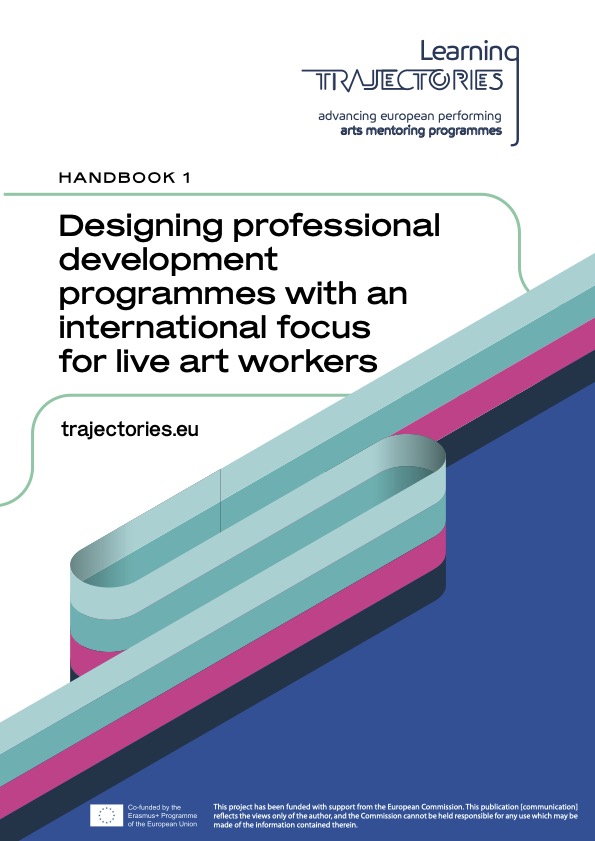 The first handbook helps stakeholders focus on the process involved in designing – or redesigning – the best possible framework for individuals to experience creative, relational and business growth in an international context.
The first handbook helps stakeholders focus on the process involved in designing – or redesigning – the best possible framework for individuals to experience creative, relational and business growth in an international context.
This ‘cookbook’ can be referred to repeatedly over the course of designing or revisiting a programme; it will help all collaborators to guide their thinking and to ask themselves pertinent questions. It is founded on extensive research about existing programmes in various countries and includes a selection of relevant examples. However, the aim is not to look backwards at what has already been done, but to help readers look forward and build what’s to come.
- Handbook Designing an international professional development programme in English.
- Handbook in French.
- Handbook in Italian.
- Handbook in Swedish.
- Organisers' Checklist in English.
Establishing country resources and documentation for internationalisation programmes
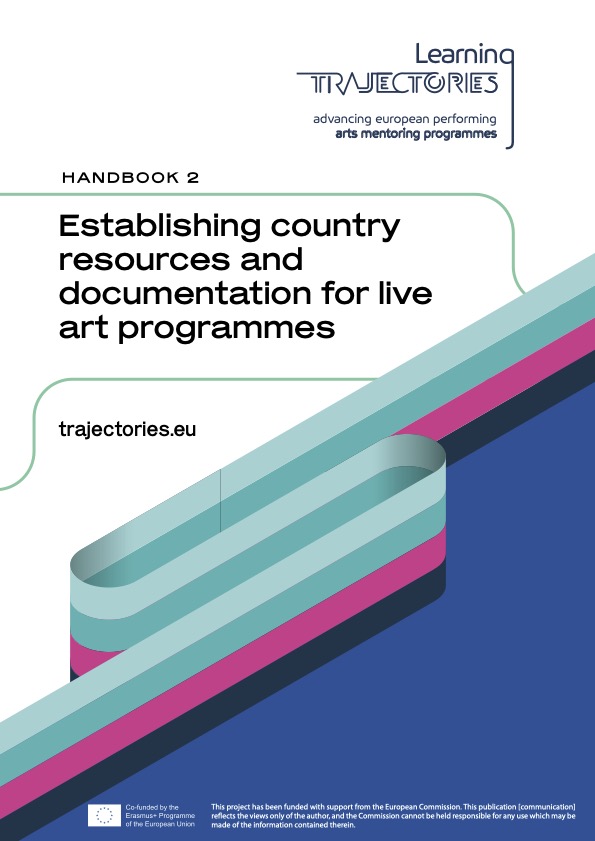 The second handbook seeks to provide some concrete advice and discussion points to international development programme organisers on how to create and circulate meaningful resources to participants to help them prepare for their mobility experience.
The second handbook seeks to provide some concrete advice and discussion points to international development programme organisers on how to create and circulate meaningful resources to participants to help them prepare for their mobility experience.
This handbook gives step-by-step guidance to help establish relevant documentation as part of the support material provided to participants and addresses critical points that should not be overlooked.
- Handbook Establishing country resources and documentation for internationalisation programmes in English.
- Handbook in French.
- Handbook in Italian.
- Handbook in Swedish.
Designing and intermediating professional mobility experiences for live art workers
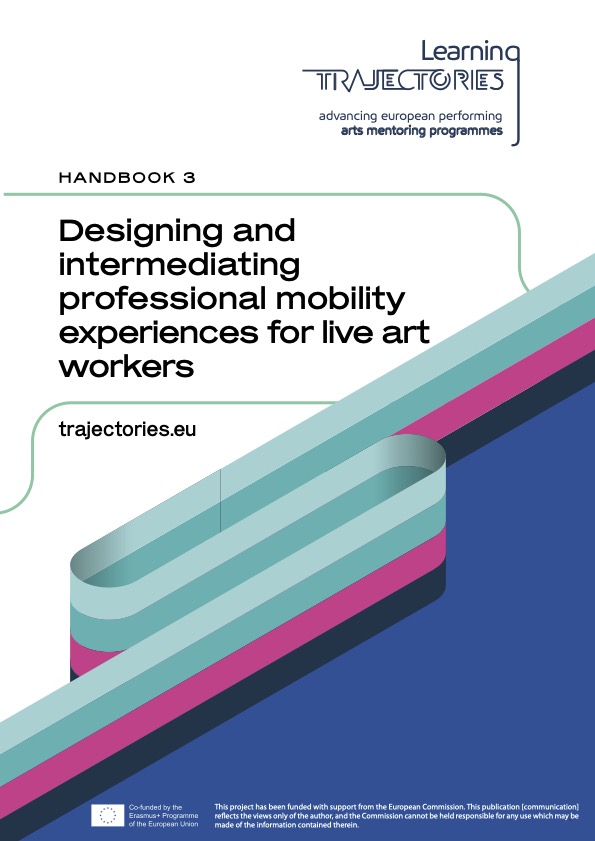 The third document highlights the relevance of cross-border cultural mobility and its impact on the professional and creative development of artists and culture professionals. Undertaking a mobility experience helps participants embrace diversity and test approaches outside a familiar environment.
The third document highlights the relevance of cross-border cultural mobility and its impact on the professional and creative development of artists and culture professionals. Undertaking a mobility experience helps participants embrace diversity and test approaches outside a familiar environment.
In order to maximise the experience, mobility needs intermediaries who facilitate participants’ experiences in an inclusive and accessible way. These intermediaries provide access to new professionals, stakeholders and markets, taking care of mitigating possible cultural, social and physical barriers. This handbook aims at raising questions in order to enhance the quality and success of the mobility experiences, see them from a different angle and contributing to sustainable, accessible and inclusive practices.
- Handbook Designing and intermediating professional mobility experiences in English.
- Handbook in French.
- Handbook in Italian.
- Handbook in Swedish.
Annotated Bibliography
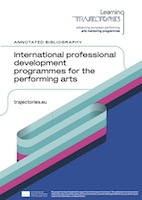 The annotated bibliography provides key resources and inspiring examples for the development of preparatory support information for trainees and mentees, whether they are artists or arts professionals. It gathers a selection of documents that present specific contexts, mostly countries but sometimes also macro-regions. In addition, the bibliography identifies examples of cross-sectoral cultural mappings that gives an overview of all culture and creative industries and details national public policies. The sources listed also cover a variety of information providers and/or publishers, from independent arts organisations to ministries in charge of cultural affairs.
The annotated bibliography provides key resources and inspiring examples for the development of preparatory support information for trainees and mentees, whether they are artists or arts professionals. It gathers a selection of documents that present specific contexts, mostly countries but sometimes also macro-regions. In addition, the bibliography identifies examples of cross-sectoral cultural mappings that gives an overview of all culture and creative industries and details national public policies. The sources listed also cover a variety of information providers and/or publishers, from independent arts organisations to ministries in charge of cultural affairs.
This annotated bibliography is by no means exhaustive and is rather meant as a guide, which provides an overview of the different typologies and formats used in the field to inform stakeholders when developing international relations or when preparing a mobility experience in another country. It can also be used to identify key information providers and relevant documentation on specific performing arts sub-sectors.
